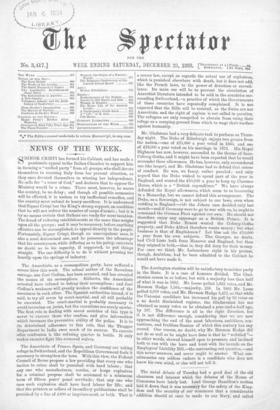The Accrington election will be satisfactory to neither party in
the State. It is a case of honours divided. The Glad.- stonian comes in as before, but with a majority less than half of what it was in 1892. Mr. Leese polled 5,822 votes, and Mr. Hermon Hodge 5,564,—majority, 258. In 1892 Mr. Leese polled 6,019 votes, and Mr. Hermon Hodge 6,472, so that while the Unionist candidate has increased his poll by 92 votes on a no doubt diminished register, the Gladstonian has not obtained so many votes as he obtained a year-and-a-half ago, by 197. The difference is all in the right direction, but it is not difference enough, considering that we are now approaching the end of the most laborious, ambitious, con- tentious, and fruitless Session of which this century has any record. One reason, no doubt, why Mr. Hermon Hodge did not do so well as he might have done is that he "wobbled "- in other words, showed himself open to pressure, and inclined both to run with the hare and hunt with the hounds on the Employers' Liability Bill,—the oontraoting.out question,—and this never answers, and never ought to answer. What con- stituencies can seldom endure is a candidate who does not know his own mind, or else will not tell it.


































